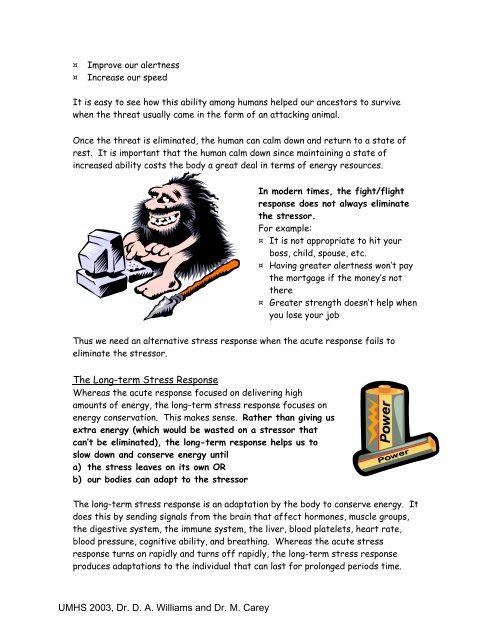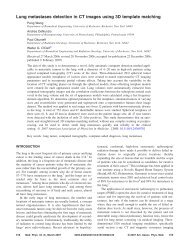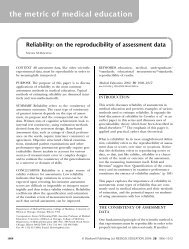CHAPTER 2: HOW DOES STRESS RELATE TO
CHAPTER 2: HOW DOES STRESS RELATE TO
CHAPTER 2: HOW DOES STRESS RELATE TO
You also want an ePaper? Increase the reach of your titles
YUMPU automatically turns print PDFs into web optimized ePapers that Google loves.
¤ Improve our alertness¤ Increase our speedIt is easy to see how this ability among humans helped our ancestors to survivewhen the threat usually came in the form of an attacking animal.Once the threat is eliminated, the human can calm down and return to a state ofrest. It is important that the human calm down since maintaining a state ofincreased ability costs the body a great deal in terms of energy resources.In modern times, the fight/flightresponse does not always eliminatethe stressor.For example:¤ It is not appropriate to hit yourboss, child, spouse, etc.¤ Having greater alertness won’t paythe mortgage if the money’s notthere¤ Greater strength doesn’t help whenyou lose your jobThus we need an alternative stress response when the acute response fails toeliminate the stressor.The Long-term Stress ResponseWhereas the acute response focused on delivering highamounts of energy, the long-term stress response focuses onenergy conservation. This makes sense. Rather than giving usextra energy (which would be wasted on a stressor thatcan’t be eliminated), the long-term response helps us toslow down and conserve energy untila) the stress leaves on its own ORb) our bodies can adapt to the stressorThe long-term stress response is an adaptation by the body to conserve energy. Itdoes this by sending signals from the brain that affect hormones, muscle groups,the digestive system, the immune system, the liver, blood platelets, heart rate,blood pressure, cognitive ability, and breathing. Whereas the acute stressresponse turns on rapidly and turns off rapidly, the long-term stress responseproduces adaptations to the individual that can last for prolonged periods time.UMHS 2003, Dr. D. A. Williams and Dr. M. Carey
















